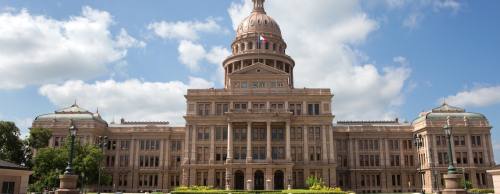1. Child Protective Services
In his address, Abbott called changes to CPS a "life-or-death issue." He said 100 children died in the care of CPS last year. "[To] do this right, the budget I have issued today [the budget has] more than either the House or Senate," Abbott said. "Do not underfund this rickety system only to have it come back and haunt you in years to come. When you tackle the CPS and foster care this session, do it right." In October, Gov. Abbott joined with state House Speaker Joe Straus, R-San Antonio, and Lt. Gov. Dan Patrick to order Child Protective Services to work on a plan to protect endangered children in the foster care system. The order required the department to focus on retention and recruitment of new case workers. This order followed an announcement by CPS that more than 1,000 at risk children were not checked on in a six-month time period. On Monday, CPS testified before the Senate Finance Committee with less than satisfying results from changes in the past few months. Commissioner Hank Whitman said the on any given day, 400 to 450 Priority 1 children, deemed the most at risk of abuse, are not checked on. This number is down, only minimally, from October. The House's workgroup on CPS held a press conference Monday that called for the Department of Family and Protective Services to become its own agency, independent of the Department of Health and Human Services. This would mean DFPS would report directly to Abbott.2. Sanctuary cities
Abbott has recently been vocal about his wishes to eliminate sanctuary cities in Texas. While there is no strict definition of a sanctuary city, most agree the term refers to a city that refuses to comply with Immigration and Customs Enforcement policies. Newly elected Travis County Sheriff Sally Hernandez announced in January she would not comply with policies that call for undocumented immigrants in jail to continue being detained. She said she would limit cooperation with ICE within Travis County Jail so county residents can continue reporting crimes without fear of deportation. "It is time for Texas to take a stand," Abbott said. "Some law enforcement officials are openly refusing to enforce existing law. That is unacceptable." Abbott previously responded with calls to disrupt funding to Travis County as a result. He has asked for all state agencies to report what funding they provide to Travis County. He has also stated he would work to get rid of any state officials announcing their support of sanctuary cities.And I'm about to up the ante. No more sanctuary cities in Texas. #txlege https://t.co/YIyYdBkL1x
— Greg Abbott (@GregAbbott_TX) January 18, 2017
3. Ethics
In 2015, Abbott called for a number of ethics reforms throughout the government including preventing retired legislators from immediately lobbying the state and requiring lawmakers to disclose contracts with public entities. The session ended with back-and-forth blaming between the House and Senate as to why reforms did not pass. Abbott emphasized again this issue in his 2017 State of the State address. "It's time to let Texans know if elected officials have government contracts paid for by taxpayers," he said. "Voters deserve to know if officials are working on themselves or the people who elected them." Rep. Charlie Geren, R-Fort Worth, and Sen. Van Taylor, R-Plano, have already filed a number of bills to tackle the issue of ethics reform.4. Convention of states
Following the November presidential election, Gov. Abbott renewed his calls to form a convention of states. Based on Abbott's previously suggested constitutional amendments, the convention could amend the U.S. Constitution to implement term limits for members of Congress, require Congress to adopt a balanced budget and allow more than 33 states to join together to override a Supreme Court decision. "All three branches of government have so far strayed from what the Constitution provides [that] it is impossible to put that genie back in the box by just one president," Abbott said in December. Abbott brought this up again in his address to the House and Senate, saying that multiple presidents have contributed to the government growing too large. He said it would take more than one president to reverse that.Other notable elements from Abbott's address:
- Abbott called for an immediate hiring freeze on all state agencies to last until August. This freeze would save the government $200 million from its current budget, Abbott said.
- Abbott also devoted a large portion of his speech to education, covering school choice and problems with the school finance system. However, he did not declare education an emergency item.
- Abbott called again for the eventual elimination of the franchise tax. He also called on the Legislature to fully fund the Enterprise Fund, which he said would help recruit business to Texas.
In his last State of the State address in 2015, Abbott named five total emergency items, including early education, higher education research initiatives, transportation funding, border security funding and ethics reform. As part of action surrounding this list, the legislature created a grant for pre-kindergarten programs that divvied up $116 million for close to 600 school districts, allocated $800 million in state dollars to border security and floated a ballot proposition to directly route $5 billion in sales and use tax revenue to transportation funding (which eventually passed). As part of action surrounding this list, the legislature created a grant for pre-k programs that divvied up $116 million for close to 600 school districts, allocated $800 million in state dollars to border security and floated a ballot proposition to directly route $5 billion in sales and use tax revenue to transportation funding (which eventually passed). Here is a full text of the governor's last State of the State address.




